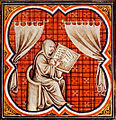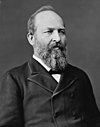Portal:Biography
The Biography Portal
A biography, or simply bio, is a detailed description of a person's life. It involves more than just basic facts like education, work, relationships, and death; it portrays a person's experience of these life events. Unlike a profile or curriculum vitae (résumé), a biography presents a subject's life story, highlighting various aspects of their life, including intimate details of experience, and may include an analysis of the subject's personality.
Biographical works are usually non-fiction, but fiction can also be used to portray a person's life. One in-depth form of biographical coverage is called legacy writing. Works in diverse media, from literature to film, form the genre known as biography.
An authorized biography is written with the permission, cooperation, and at times, participation of a subject or a subject's heirs. An unauthorized biography is one written without such permission or participation. An autobiography is written by the person themselves, sometimes with the assistance of a collaborator or ghostwriter. (Full article...)
Featured biographies –
Nyuserre Ini (also Niuserre Ini or Neuserre Ini; in Greek known as Rathurês, Ῥαθούρης) was an Ancient Egyptian pharaoh, the sixth ruler of the Fifth Dynasty during the Old Kingdom period. He is credited with a reign of 24 to 35 years depending on the scholar, and likely lived in the second half of the 25th century BCE. Nyuserre was the younger son of Neferirkare Kakai and queen Khentkaus II, and the brother of the short-lived king Neferefre. He may have succeeded his brother directly, as indicated by much later historical sources. Alternatively, Shepseskare may have reigned between the two as advocated by Miroslav Verner, albeit only for a few weeks or months at the most. The relation of Shepseskare with Neferefre and Nyuserre remains highly uncertain. Nyuserre was in turn succeeded by Menkauhor Kaiu, who could have been his nephew and a son of Neferefre.
Nyuserre was the most prolific builder of his dynasty, having built three pyramids for himself and his queens and completed a further three for his father, mother and brother, all in the necropolis of Abusir. He built the largest surviving temple to the sun god Ra constructed during the Old Kingdom, named Shesepibre or "Joy of the heart of Ra". He also completed the Nekhenre, the Sun temple of Userkaf in Abu Gorab, and the valley temple of Menkaure in Giza. In doing so, he was the first king since Shepseskaf, last ruler of the Fourth Dynasty, to pay attention to the Giza necropolis, a move which may have been an attempt to legitimise his rule following the troubled times surrounding the unexpected death of his brother Neferefre. (Full article...)
Humphreys became involved in petty crime early in life, and was first arrested at the age of 15. The severity of his crimes increased over time and, in March 1958, he was sentenced to six years' imprisonment after using explosives to open a safe and steal £8,260 in money and postal orders. On his release he opened a strip club in Soho, the centre of London's sex industry. As Humphreys expanded his business and moved into other areas of the sex industry—sex shops and book shops selling obscene material—he had to bribe an increasing number of officers to be able to operate. (Full article...)
Thekla (Greek: Θέκλα; early 820s or 830s – after 870), Latinized as Thecla, was a princess of the Amorian dynasty of the Byzantine Empire. The eldest child of Byzantine emperor Theophilos and empress Theodora, she was proclaimed augusta in the late 830s. After Theophilos's death in 842 and her mother becoming regent for Thekla's younger brother, Michael III, Thekla was associated with the regime as co-empress alongside Theodora and Michael.
Thekla was deposed by Michael III, possibly alongside her mother, in 856 and consigned to a convent in Constantinople. Some time later, she allegedly returned to imperial affairs and became the mistress of Michael's friend and co-emperor Basil I. After Basil murdered Michael in 867 and took power as the sole emperor, Thekla was neglected as his mistress and she took another lover, John Neatokometes. Once Basil found out about the affair, Thekla fell out of favor, was beaten and had her property confiscated. (Full article...)
Abu Muhammad Hasan al-Kharrat (Arabic: حسن الخراط Ḥassan al-Kharrāṭ; 1861 – 25 December 1925) was one of the principal Syrian rebel commanders of the Great Syrian Revolt against the French Mandate. His main area of operations was in Damascus and its Ghouta countryside. He was killed in the struggle and is considered a hero by Syrians.
As the qabaday (local youths boss) of the al-Shaghour quarter of Damascus, al-Kharrat was connected with Nasib al-Bakri, a nationalist from the quarter's most influential family. At al-Bakri's invitation, al-Kharrat joined the revolt in August 1925 and formed a group of fighters from al-Shaghour and other neighborhoods in the vicinity. He led the rebel assault against Damascus, briefly capturing the residence of French High Commissioner of the Levant Maurice Sarrail before withdrawing amid heavy French bombardment. (Full article...)
José Maria da Silva Paranhos, Viscount of Rio Branco (16 March 1819 – 1 November 1880), was a Brazilian politician, monarchist, diplomat, teacher and journalist. Rio Branco was born in Salvador, in what was then the Captaincy of Bahia, to a wealthy family, but most of the fortune was lost after his parents' deaths early in his childhood. In 1871, Rio Branco became the president of the Council of Ministers (Prime Minister) for the first time. He would become the Council's longest-serving president, and his cabinet the second longest, in Brazilian history. His government was marked by a time of economic prosperity and the enactment of several reforms. The most important of these initiatives was the Law of Free Birth, which granted freeborn status to children born to slave women. Rio Branco led the government that enacted this law, and its passage increased his popularity. His government was plagued by a long crisis with the Catholic Church that resulted from the expulsion of Freemasons from its lay brotherhoods. After more than four years heading the Cabinet, Rio Branco resigned in 1875. Following a long vacation in Europe, his health swiftly declined and he was diagnosed with oral cancer. Rio Branco died in 1880 and was widely mourned throughout the country. He is regarded by most historians as one of Brazil's greatest statesmen.
Rio Branco attended Brazil's Naval School and became a midshipman in 1841. Later that year he was enrolled in the Army's Military Academy, eventually becoming an instructor there. Rather than continue to serve in the military, he became a politician in the Liberal Party. In 1845, he was elected a member of the provincial house of representatives of Rio de Janeiro province, site of the national capital of the same name. Rio Branco rose to power within the province under the tutelage of Aureliano Coutinho, Viscount of Sepetiba—a veteran politician who held tremendous influence over the young and inexperienced Emperor Pedro II. He temporarily abandoned politics after Aureliano Coutinho's fall from grace and the subsequent dissolution of the Liberal Party. (Full article...)
John Sherman (May 10, 1823 – October 22, 1900) was an American politician from Ohio who served in federal office throughout the Civil War and into the late nineteenth century. A member of the Republican Party, he served in both houses of the U.S. Congress. He also served as Secretary of the Treasury and Secretary of State. Sherman sought the Republican presidential nomination three times, coming closest in 1888, but was never chosen by the party.
Born in Lancaster, Ohio, Sherman later moved to Mansfield, Ohio, where he began a law career before entering politics. He was the younger brother of Union general William Tecumseh Sherman, with whom he had a close relationship. Initially a Whig, Sherman was among those anti-slavery activists who formed what became the Republican Party. He served three terms in the House of Representatives. As a member of the House, Sherman traveled to Kansas to investigate the unrest between pro- and anti-slavery partisans there. He rose in party leadership and was nearly elected Speaker in 1859. Sherman was elected to the Senate in 1861. As a senator, he was a leader in financial matters, helping to redesign the United States' monetary system to meet the needs of a nation torn apart by civil war. He also served as the Chair of the Senate Agriculture Committee during his 32 years in the Senate. After the war, he worked to produce legislation that would restore the nation's credit abroad and produce a stable, gold-backed currency at home. (Full article...)
Maya Angelou (/ˈændʒəloʊ/ AN-jə-loh; born Marguerite Annie Johnson; April 4, 1928 – May 28, 2014) was an American memoirist, poet, and civil rights activist. She published seven autobiographies, three books of essays, several books of poetry, and is credited with a list of plays, movies, and television shows spanning over 50 years. She received dozens of awards and more than 50 honorary degrees. Angelou's series of seven autobiographies focus on her childhood and early adult experiences. The first, I Know Why the Caged Bird Sings (1969), tells of her life up to the age of 17 and brought her international recognition and acclaim.
She became a poet and writer after a string of odd jobs during her young adulthood. These included fry cook, sex worker, nightclub performer, Porgy and Bess cast member, Southern Christian Leadership Conference coordinator, and correspondent in Egypt and Ghana during the decolonization of Africa. Angelou was also an actress, writer, director, and producer of plays, movies, and public television programs. In 1982, she was named the first Reynolds Professor of American Studies at Wake Forest University in Winston-Salem, North Carolina. Angelou was active in the Civil Rights Movement and worked with Martin Luther King Jr. and Malcolm X. Beginning in the 1990s, she made approximately 80 appearances a year on the lecture circuit, something she continued into her eighties. In 1993, Angelou recited her poem "On the Pulse of Morning" (1993) at the first inauguration of Bill Clinton, making her the first poet to make an inaugural recitation since Robert Frost at the inauguration of John F. Kennedy in 1961. (Full article...)




















![Image 10 George IV Artist: Sir Thomas Lawrence An oil on canvas portrait of George IV of the United Kingdom as the Prince Regent, by Sir Thomas Lawrence. In 1814, Lord Stewart, who had been appointed ambassador in Vienna and was a previous client of Thomas Lawrence, wanted to commission a portrait by him of the Prince Regent. He arranged that Lawrence should be presented to the Prince Regent at a levée. Soon after, the Prince visited Lawrence at his studio in Russell Square. Lawrence wrote to his brother that: To crown this honour, [he] engag'd to sit to me at one today and after a successful sitting of two hours, has just left me and comes again tomorrow and the next day. More selected portraits](http://upload.wikimedia.org/wikipedia/commons/thumb/9/9f/George_IV_bust1.jpg/84px-George_IV_bust1.jpg)


























